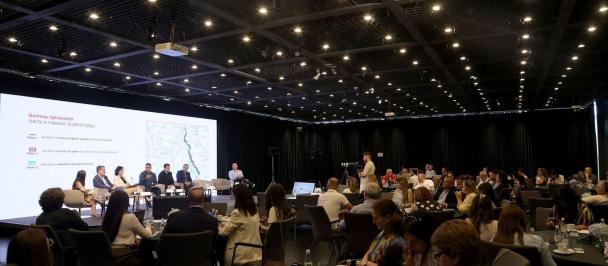By Stella Tushabe
Igitree's Tech-Powered Family Reunions
May 10, 2024

Deexon Muhizi/ Founder of Igi-Tree and Alumni of Aguka Programme
“No one should ever feel lost,” is a deep sentiment that Muhizi Deexon, a youth champion with Aguka initiative shared with our team, one that inspired him to start Igitree, a genealogy platform that reunites families. Igitree stems from two words; Igisekuruza, which is Kinyarwanda for genealogy, and tree – which together means a family tree.
In 1994, during and after the Genocide against the Tutsi, thousands of children were displaced with no hope of ever re-uniting with their families. Even though by some miracle, some families were able to reunite, today, 30 years later, several people remain in isolation due to the failure of locating other family members.
One of the beneficiaries of Igitree’s services is Mwiza (not real name), a 27-year-old who was in a hopeless state after having lost her only grandmother during the COVID-19 pandemic. As fate might have it, Mwiza is one of the first two beneficiaries of Igitree’s services – the technology that cures loneliness.
Igitree uses Artificial Intelligence (AI) and Machine Learning (ML) to match the acquired DNA with the existing database to locate relatives that were otherwise lost from each other. Even though one may not have an existing nuclear family anymore, the DNA testing is able to locate former generations, without limit, and this is how Mwiza managed to meet her grand aunt.
“Although the country (Rwanda) lost over a million people in the Genocide against the Tutsi, today, the country has up to 14 million people, and these should have an opportunity to learn about their families and hopefully meet some of their relatives.”- said Muhizi.
How does Igitree work?
To reunite families, the individual looking for their loved ones must have some basic information of whom they’re searching for, such as their name, village they live(d) in, who their neighbors were, and where they spent their time or where they worked. This allows the system to match the knowledge to the existing DNA using Machine Learning. This technology will soon be introduced to refugee camps as their occupants are constantly in need of these services.
In collaboration with the Rwanda Biomedical Centre (RBC), Igitree uses technology known as nanotech, to digitize the DNA into a database, which helps to match people’s data. Currently, Igitree is using existing data from laboratories and hospitals to match DNA with the previously crowd-sourced data, meaning that the more people volunteer to test for DNA, the more the likelihood to increase matches of displaced families.
In addition, from having a big database of DNA to reunite families, Igitree intends to translate the genetic information into the creation of long-lasting health solutions for participants such as early tracking and treating of non-communicable diseases.
What is the future of Igitree?
Igitree is working on a solution that is virtual, whereby whoever can access the internet will be able to re-unite with their families. For a country like Rwanda, with the kind of history that resulted into displaced families, this is providing breakthrough solutions that are life-changing by reuniting the families. The issue of displacement goes beyond Rwanda, and Igitree intends to extend its services to the rest of Africa, where civil wars cause family members to get displaced.
Igitree is also preventing unnecessary risks that come with incest marriages, thereby preventing genetic disorders and diseases. The government sectors would in the future be connected to Igitree so that they can match the intending (soon-to-be-married) couples to help put a stop to inter-relative marriages.
“Aguka, an initiative by UNDP, European Union and the Ministry of Youth and Arts, has played a significant role in my entrepreneurial journey by teaching and availing me with management tools that helped me excel in my venture.” Said Muhizi.
For the next two years, Igitree intends to run a campaign dubbed “Ha undi umuryango,” translated to “give families to one another.” Why? Because some orphans might have lost their immediate families, but they still have connections up to the 4th generation, which allows them to meet other relatives who share the same generation
UNDP continues to be a proud partner to the Ministry of Youth and Arts and the European Union, as well as other private companies like Norrsken, Tony Elumelu Foundation and the African Management Institute to avail platforms such as Aguka that allow youth with revolutionary ideas, such as Muhizi to grow their busineses and create a lasting impact in the country and beyond.

 Locations
Locations


